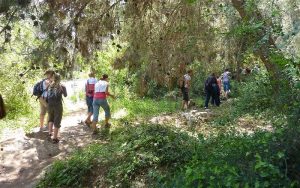 The Caspari Center has been involved in singles’ ministry since 2010. Content- and execution-wise, we’ve been consistently pleased with the various singles’ seminars and other events we’ve organized. The teachers we’ve invited have been, without exaggeration, excellent. The anonymous questionnaires we’ve given out after the events have come back with overwhelmingly positive feedback.
The Caspari Center has been involved in singles’ ministry since 2010. Content- and execution-wise, we’ve been consistently pleased with the various singles’ seminars and other events we’ve organized. The teachers we’ve invited have been, without exaggeration, excellent. The anonymous questionnaires we’ve given out after the events have come back with overwhelmingly positive feedback.
Recently, we have come to realize that we need to make some changes. Since the beginning of this ministry, the greatest challenge has been drawing a satisfactory percentage of male participants. Knowing this to be a common challenge all over the world, we did not aspire for a ratio of 50/50. In fact, we had been quite satisfied with a relatively constant ratio of 60/40 (women to men). But when the number of men started to dwindle, we felt the need to reassess what we were doing and how we were doing it.
Some of the men who attended our events in the past have since gotten married, and some have left the country. While these reasons account for some of the drop, wouldn’t it stand to reason that other men would be willing to take the place of those who are no longer eligible to attend? (There are other single men around, but they aren’t interested in attending events for “singles.”)
In our experience, one of the greatest problems facing singles’ ministry is that the word “singles” itself, for many men and even some women, connotes desperation — desperation to meet someone, anyone, and leave singleness behind. Advertising an event as an event for “singles” is our primary (insurmountable?) obstacle.
Inspired by some successful changes reported by a singles’ ministry in the United States, we made the decision to include married couples in the group, determining to keep a higher percentage of singles and to adapt the content of the events. We decided upon a new name for the ministry (Panim el Panim – “Face to Face” – taken from I Corinthians 13:12). Now, singles who had married could continue to attend the events, potentially giving more stability to a somewhat dynamic group. And the admittedly slyest part: we could escape the stigma associated with the word “singles.”
singles and to adapt the content of the events. We decided upon a new name for the ministry (Panim el Panim – “Face to Face” – taken from I Corinthians 13:12). Now, singles who had married could continue to attend the events, potentially giving more stability to a somewhat dynamic group. And the admittedly slyest part: we could escape the stigma associated with the word “singles.”
Armed with these changes, we advertised another event, an outdoor workshop with an expert on the food culture of biblical times. We walked around a nature reserve, learning about various grains and other biblical foods from a very entertaining instructor. Afterwards, we cooked together in small groups (following biblically inspired recipes) and enjoyed the meal we had made.
While the workshop was great fun, the group was so heterogeneous that it wasn’t clear why we had all gotten together. And nothing much had changed as far as the ratio of women to men; it remained high (two-thirds women, one-third men).
This is still a relatively young ministry (approximately three years), and we are still finding our way to best serve singles, as well as the married couples who would like to join them, in a way that will support, encourage and benefit them. We welcome your prayers as we attempt to do so.